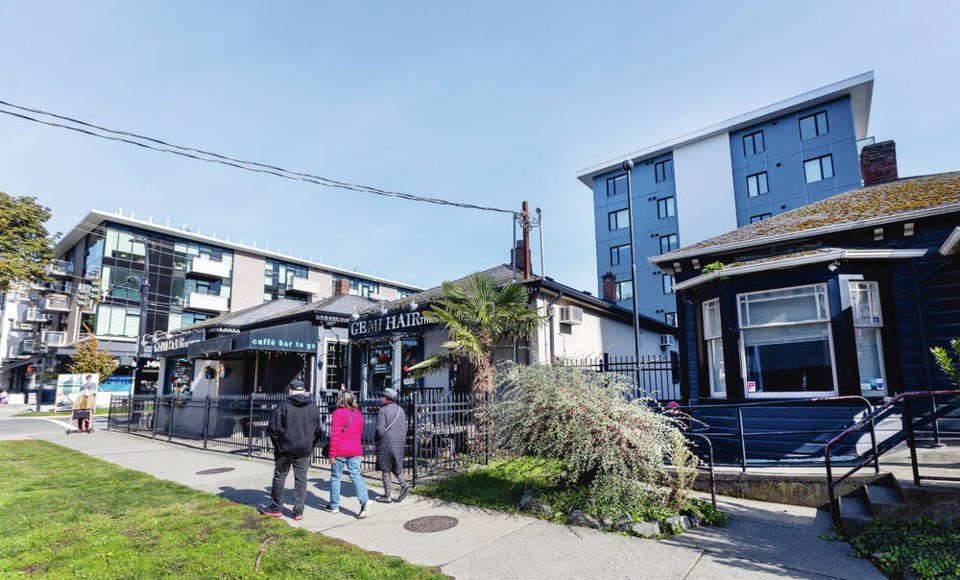The City of Victoria is preparing to launch a pilot program to provide temporary property-tax relief for some downtown businesses.
Council voted 8-1 in favour Thursday of a pilot program in the Harris Green neighbourhood that could translate into a tax break of as much as $4,925 for some properties.
“I recognize that a lot of our small businesses and our small commercial tenants are struggling right now. There’s only so much that the City of Victoria can do about some of these larger macroeconomic conditions that we find ourselves in,” said Coun. Jeremy Caradonna.
“This is our small effort on the part of the city to support small businesses that are being overtaxed.”
The program, which will be implemented next year, mirrors a pilot project launched last spring in Vancouver to tackle property taxes that have soared based on the development potential of properties.
Because properties are assessed based on the highest and best use of a site, some older and smaller buildings are being assessed as if they are the new condominium towers and mixed-use projects they could be rather than the one- and two-storey buildings that they are.
That leads to high assessments and high tax bills, which in turn tends to push out the small and medium-sized businesses that lease space in the buildings. Many of those businesses have signed triple-net leases with their landlords and building owners, meaning property tax increases are the small business’s responsibility.
To address that problem, Victoria will run a pilot program in Harris Green that will tax 20 per cent of the assessed land value of a property at 50 per cent of the normal light industrial or commercial rate.
For example, a Harris Green property with a land value of $2.23 million could see its annual property tax bill of $38,751 reduced by $2,409.
City staff estimate, based on ÎÚÑ»´«Ã½ Assessment data, that about 20 sites in Harris Green would be eligible to participate in the pilot program, with the median savings ranging from $1,060 to $4,925. Most properties would realize tax savings of about $2,490.
Jeff Bray, chief executive of the Downtown Victoria Business Association, said they have been pushing for this kind of program since the province made it possible with legislation in 2022.
“We’re very happy to see the council moving forward with this pilot in Harris Green. Of course we’ll want to see it expanded throughout, but we’re happy to see that they’ve taken up the opportunity to try to provide some relief,” he said.
Bray said the existing system that taxes small buildings as though they are massive towers puts enormous pressure on commercial tenants to deal with property-tax increases.
He said the City of Victoria’s program — which is temporary with properties only getting relief for five years — is really only a bandage and the real problem is at the provincial level. “We are advocating that the provincial government take a look at the ÎÚÑ»´«Ã½ Assessment Act to find a different way of dealing with development potential that doesn’t absolutely hammer our small and medium-sized businesses,” he said. His group has been calling for a review of the act, particularly the definition of best and highest use.
Bray said the rules squeeze out small businesses and force building owners to redevelop even if they don’t want to.
“The building gets completely redeveloped, which means you lose the small and medium-sized business. There’s two or three years of construction and you get a new tower with some commercial space, but that commercial space has to cover the cost of all the construction,” he said, noting it’s rare that small businesses and mom-and-pop stores can afford the new lease rates.
“So you change the face and the feel of your area as a result.”
A spectrum of properties are not eligible, including parking lots, automotive dealers and mechanics, gas stations, offices, storage, hotels, large retail chains, government properties, national chains and banks.
Eligible property owners will be required to submit a declaration regarding the use of the property and false declarations may be subject to a $10,000 fine.
Bruce Williams, chief executive of the Greater Victoria Chamber of Commerce, said the chamber has pushed for government to invest in growing the tax base rather than spending tax money on relief.
“At first glance, the city’s proposal fits with that concept by encouraging businesses that couldn’t otherwise afford the cost of establishing in that neighbourhood. Having small businesses, specifically restaurants and retail, creates vibrancy which encourages consumer spending and makes the entire area more livable and less prone to social problems that create costs for government,” he said.
Coun. Matt Dell said the pilot project is an innovative approach and worth a try.
“There might be a business in Harris Green that’s a one-storey restaurant, and there’s a business six blocks away that’s a one-storey restaurant and because the one in Harris Green is zoned through our [Official Community Plan] for 30 storeys, they’re having a huge tax burden put on them where someone just a couple blocks away, maybe in Fernwood, has none of that tax burden,” he said.
City staff estimate the 20 eligible Harris Green properties would save a total of about $56,000 in property tax. That tax burden would then be spread among the more than 3,000 Victoria businesses in the same class, adding $18 on average to their property tax bills.
Caradonna said he had some concerns about the tax burden being shifted to other businesses but felt the work council intends to do to trim next year’s budget should offset the small tax increase.
Coun. Marg Gardiner was the only councillor who voted against the pilot project.
“I just can’t support any more programs, new programs that will add both administrative costs and financial costs to others,” she said.
>>> To comment on this article, write a letter to the editor: [email protected]



